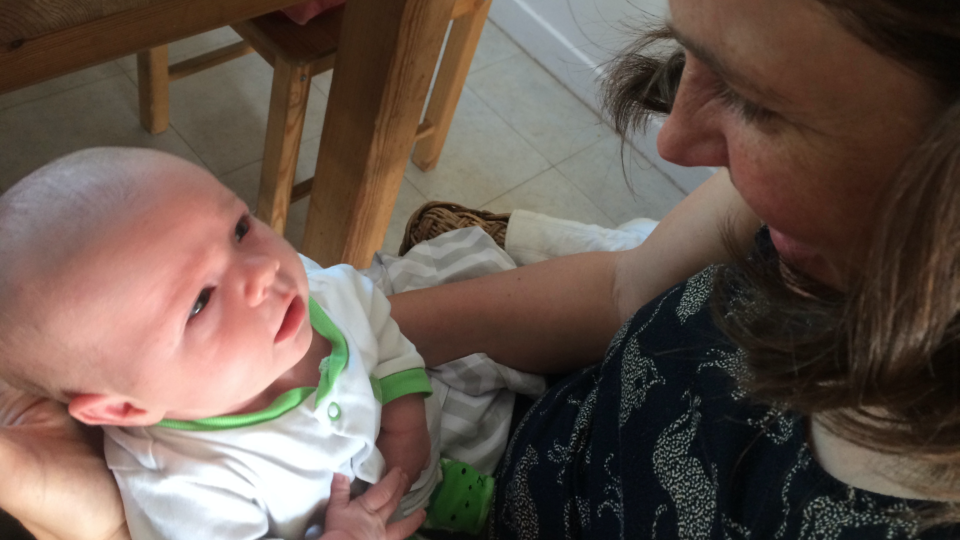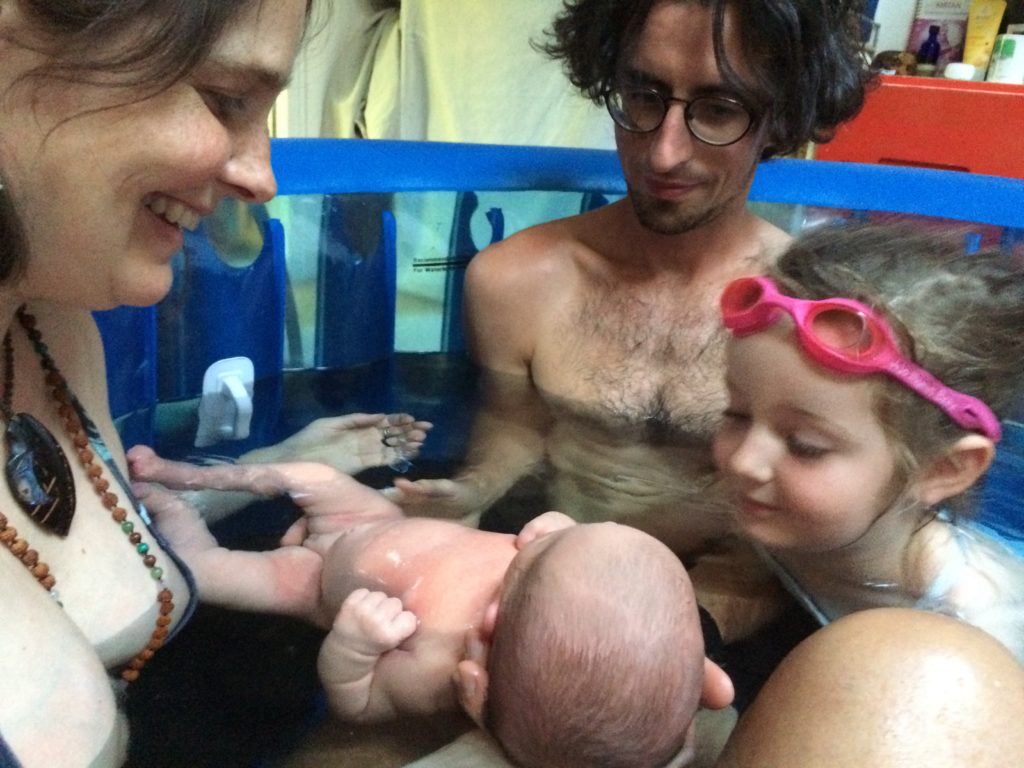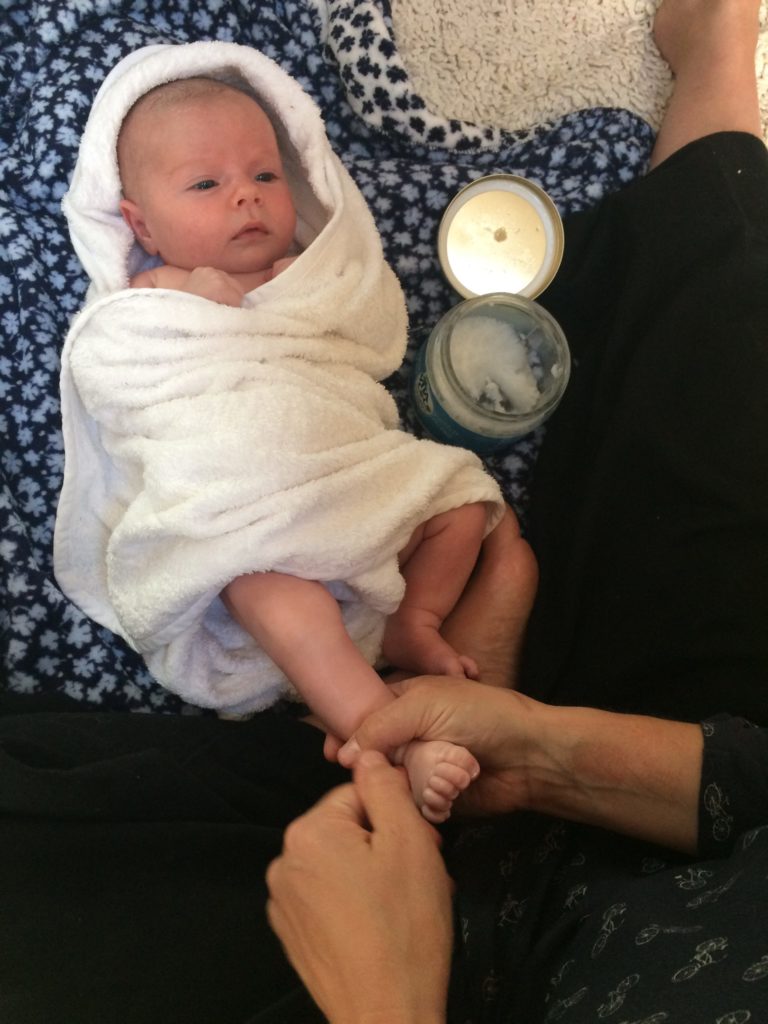
Nurture: nourishing with care and love for growth and abundance.
I was fortunate to share the lives of Amazonian indigenous people who showed me nurture in action with their babies and their plants. Daily splash baths for babies, a practice that many groups share in the Amazon basin, are not just for keeping babies clean. Bathing, touch, movement, handling in water are seen as necessary to ‘grow babies beautiful and strong’. Acts of care are not chores like the washing of clothes, that women often do in the river after bathing and feeding their babies and rocking them to sleep in baby hammocks. Baby baths are an enjoyable, creative activity, somewhere between ritual and art. They add to life day by day.
When childbirth was moved to hospitals in civilized nations, so was the newborn’s first bath. It became part of the maternity care protocol to bathe newborns soon after birth. Training videos for this still commonly found ‘procedure’abound on the internet, ignoring horrendous screams and distress cues. In response to research showing the beneficial properties of the vernix caseosa, the whitish substance that protects newborns’ skin, many hospitals round the world have now delayed first baths for 24 hours. There is also a marked trend towards giving babies more consideration: the research on early communication pioneered and popularized by Marshall Klaus (The Amazing Talents of the Newborn) and Berry BrazeltonLearning to Listen)is finally seeping into maternity professionals’ curricula and general awareness.Some maternity nurses, sensitive to babies’ plight, have recently developed ‘gentle protocols’ for use by other professionals. Yet it is still seen as ‘normal’ that many newborns have strong negative reactions to being bathed. They are labelled as ‘hating the water’.
Do they really have an aversion to water? Absolutely not. Newborns are mostly straightforward creatures. They tend to scream when their basic needs are not met, or are ignored, and even violated. This causes them pain. Let’s rethink the first bath into the joyful experience that it can easily be.
First, have we checked the basics? Water and air temperature to suit newborns’ comfort needs (37-38ºC, dip your elbow in the bath if you do not have a thermometer handy). Make sure there are no drafts you might not mind but babies will feel. For bathing a newborn, at first a basin or an old-fashioned simple baby bathtub may be most comfortable. If you have bought one of the fancy baths with integrated reclining seats, keep it for later. You do not want to bathe your newborn strapped into a kind of car seat!

Second, is your newborn sensitive to being undressed for nappy changes? If so, s(he) could benefit from a muslin wrap for a swaddle bath that will create a comfort zone between the room and the bath. Is your baby starving or just going into deep sleep? Then it may not be the best time for bath. Newborns can be fed before being bathed, and the bath will not slow down the healing of their cords.
Third, two inter-related factors are most important for success. They are mentioned less often on the ‘baby care’ internet sites. One is the quality of your support. If it is not relaxed, your baby will pick this up. It is normal for a new parent to feel tense while handling a slippery new baby, particularly if you are nervous around water safety. To make your hold more secure, have one hand loosely cupped under your baby’s head and the other hand under his/her seat, with your thumb and index finger circling one of the little thighs. Once in the water, this grip can be undone. Only keep your seat hand if you feel you need it for your reassurance. Gently relax the head hand, letting the water providing the support for your baby. The other factor is communication. Newborns understand far more than we think they do.They need to be introduced to the bath and yes, consulted about it (as about many other things we do). It may seem contrived to have a running commentary about how you are preparing the bath and how you feel. Forget about self-conscious hang ups, your baby loves the sound of your voice and talking also slows down your breathing and keeps you calm. Looking at your baby’s face, perhaps with eye contact, and responding with facial expressions will start the dialogue that research shows babies crave for from birth. If you have been brought up thinking that newborns are not fully conscious beings, new research has revealed this is not the case: newborns are arch communicators. We adults are usually inept at deciphering their body language.
Living within a mostly visual and verbal culture, Western parents need to engage in ‘dialogues’ with their babies while developing the non-verbal communication skills that my Amazonian hosts pitied me for lacking. They patiently and systematically set out to teach me their style of parenting, for my baby’s sake. I am forever grateful to them for this. First baths matter because we now understand how positive memories can superimpose some of the traumatic ones which may have impacted babies’ limbic system before or during birth.
Water is a healing matrix, the source of life on our planet. In our global lifestyle, water is a way to renew our connection with elemental forms of being. Giving birth in water is a recent cultural innovation that insulates women and eases physiological labour. Baby swimming is our way to recreate the unboundedness of the ocean as we hold and float with infants in small pools of warm, safe clean water. First baths with a focus on joint parent-newborn relaxation, rather than sheer hygiene, support the transition from womb to world in a gentle and organic way. As new parents return home sooner and sooner after hospital births, they can take ownership of this transition with home baths. Remember, parents are the experts.

Techniques of newborn baths are simple. If we let the babies guide us, we see whether they are in a relaxing sensory integration mode, simply enjoying the medium. Some newborns perceive the opportunity for stretching and enjoy kicking back from the edge of the tub. In the bath, the challenges of feeding are removed: communication takes center stage. If you have a home bathtub, or if you have hired or purchased a birthing pool, a family bath can provide a special opportunity for siblings to greet the new baby in water. The Birthlight booklet Aqualight for Newborns (2008) shows practices done with a 9-day old baby and his parents in a first shared bath experience.
Many parents ‘discover’ their babies’ presence in a way that they can less often do while handling them on dry land. Besides being asuperb developmental opportunity for newborns, joyful first baths can be unforgettable bonding moments at the early stages of parent-baby relationships.
Birthlight’s short course ‘Aquatic Nurture for Newborns’ (2 days) is now available online. Contact us or call us on 012233 62288 for further information.